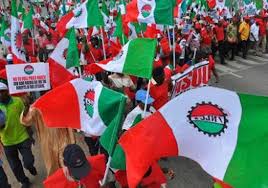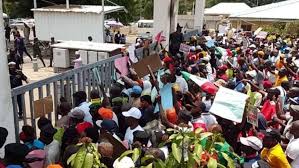
Workers compensation: FG backtracks as NLC holds ground
The Federal Government has committed to reversing the deductions from the Employees’ Compensation Scheme overseen by the Nigeria Social Insurance Trust Fund, in an effort to alleviate tensions with the Nigeria Labour Congress, following the union's threat of a nationwide strike.
Recently, the NLC accused the Federal Government of misappropriating 40 percent of NSITF contributions for the government’s treasury. The NLC stated that this action undermined the social protection of workers and demanded an immediate refund along with the complete reconstitution of the National Pension Commission board. It cautioned that failure to comply could lead to industrial action across the nation.
The Employees’ Compensation Scheme is a social insurance initiative that offers financial assistance to employees who experience work-related injuries, illnesses, disabilities, or fatalities. This scheme is entirely funded by employer contributions, which are generally around one percent of the monthly payroll, with no contributions required from employees.
In a correspondence addressed to the NLC on August 16, 2025, NSITF Managing Director Oluwaseun Faleye affirmed that deductions had been made from workers’ compensation contributions; however, he clarified that these were not a misappropriation of funds. This letter was also forwarded to the Ministers of Labour and Finance, the Director-General of the Budget Office, and the Accountant-General of the Federation.
Faleye explained that the deductions were in accordance with a federal policy implemented in December 2023, which mandated all government-owned enterprises to allocate half of their internally generated revenue to the treasury. This policy, introduced by the Minister of Finance and Coordinating Minister of the Economy Wale Edun, aimed to enhance government revenue and address a growing fiscal deficit, reflecting a fiscal strategy that has been strongly advocated by President Bola Tinubu.
“Recall that the Federal Ministry of Finance circular (Ref: FMFCME/OTHERS/IGR/CFR/21/2021) dated December 28, 2023, introduced a policy of automatic deduction of 50 per cent from the internally generated revenue of all Federal Government-owned enterprises,” Faleye detailed in the letter.
The agency announced that the contributions made by employers, which are considered statutory liabilities rather than government revenue, are no longer being deducted as per a directive issued by the Accountant-General of the Federation in March 2024. Additionally, some of the funds that were previously deducted have already been reversed.
He stated that deductions on investment income derived from these contributions are still ongoing, and the NSITF is in active discussions with the relevant authorities to address the issue. Officials from both the Budget Office and the Ministry of Finance have assured that no further debits will occur.
“We have been assured that this matter will be addressed. Both the Minister of Finance and the Director-General of the Budget Office, in meetings held in August 2025, committed that no further deductions would be made from either contributions or investment proceeds,” the NSITF assured.
Tinubu appointed Tanimu Yakubu as Director-General of the Budget Office in June 2024, following the expiry of Ben Akabueze’s tenure, and in March 2025, named Shamsedeen Ogunjimi Accountant-General of the Federation to succeed the retired Oluwatoyin Madehin.
NLC’s reaction
The labor union confirmed that it has received the letter from NSITF; however, it stated that its executive council will evaluate the correspondence prior to making a decision regarding the suggested strike, as noted by Assistant General Secretary Christopher Onyeka.
Onyeka characterized NSITF as a tripartite organization that is collectively owned by workers, employers, and the government, asserting that it should not be regarded as a profit-generating entity.
“The contributions to NSITF are intended to compensate workers in the event of injury. They are not government revenue and should not be used for fiscal purposes,” he said.
“Depleting these funds would compromise the agency’s ability to support workers when required. It is anomalous for the Ministry of Finance to classify NSITF as a revenue-generating entity.”
The union observed that the deductions commenced under the present administration and indicated that correspondence was dispatched to the Ministry of Finance and NSITF over a month ago. A response was received by the union on Saturday. "It is our duty to safeguard these funds," Onyeka remarked.
In the meantime, in response to claims that NSITF was attempting to modify the Employees’ Compensation Act in a manner that could jeopardize workers’ rights, Faleye stated that the agency’s proposals were intended to enhance enforcement, not to diminish protections.
"As an organization striving to improve its operational efficiency, we have interacted with the National Assembly through our annual retreats, which include participation from other tripartite stakeholders. During these retreats, we presented suggestions and recommendations to National Assembly members, which we believe will further bolster compliance with the Employees’ Compensation Scheme," the agency articulated.
Among those recommendations, among others, is the necessity to grant NSITF greater authority to enforce compliance with the ECA against non-compliant employers. This recommendation will better strengthen and safeguard workers’ rights rather than compromise them.
The executive further stated that any subsequent legislative measures are the responsibility of the National Assembly. "As an organization, it is beyond our scope to legislate or impede the amendment process of any act by the National Assembly. That authority is exclusively held by the legislature. We have committed to participating in the process at the appropriate time during stakeholder engagement activities for such amendments, and we will encourage all stakeholders to also engage suitably so that we can achieve a comprehensive law upon completion," Faleye concluded.
PenCom Governing Board
The NLC has also expressed concerns regarding the lack of constitution for the PenCom, characterizing this situation as a significant violation of the law that may jeopardize the oversight of workers’ retirement savings.
In a statement released last week by its Central Working Committee, the NLC indicated that the lack of a fully constituted board is in violation of the PenCom Act and other pertinent regulations. The union cautioned that the existing void permits the federal government to exert unilateral control over pension funds contributed by both workers and employers, thereby undermining the statutory tripartite oversight and heightening the risk of mismanagement and political interference.
“The NLC notes with grave concern the non-constitution of the Governing Board of PenCom, in contravention of the PenCom Act and other statutes. This unlawful vacuum has allowed the government to solely superintend over the pension funds contributed by workers and employers, stripping away the statutory tripartite oversight and increasing the risk of mismanagement and political interference,” the statement said.
The labour union stressed that pension funds represent deferred wages for workers, not government revenue, and called for immediate action to restore proper governance. “We demand the immediate constitution of the PenCom Board in full compliance with the law,” the NLC added.
Section 19 of the Pension Reform Act 2014 provides for a 16-member PenCom Governing Board. The President appoints the Chairman, Director General, and four full-time Commissioners, subject to Senate approval. The remaining ten seats are reserved for representatives from key stakeholders, including the NLC, Trade Union Congress, Nigeria Union of Pensioners, and the Nigeria Employers’ Consultative Association.
The previous board was dissolved on 16 June 2023, along with other federal parastatal boards, following a directive from President Bola Tinubu. While several boards have since been reconstituted, PenCom’s board remains incomplete.
Director-General, Omolola Oloworaran, was appointed on 13 July 2024 and confirmed by the Senate on 21 November 2024, but the Chairman and four full-time Commissioners have not yet been named. Once appointed, institutions, including the Central Bank, Securities and Exchange Commission, and Federal Ministry of Finance, will nominate their representatives.
Ivor Takor, the Director of the Centre for Pension Rights Advocacy, expressed that the postponement in reconstituting the board is a valid concern. The executive stated, "The NLC’s demand for the swift reconstitution of the board aligns with the Pension Reform Act 2014."
Regarding the NLC’s inquiry about pension fund accounts, Takor clarified the existence of two categories of funds: administrative funds overseen by PenCom and pension assets managed by Pension Fund Administrators.
“PenCom administrative funds are reported to the Governing Board, and it is the responsibility of board representatives to relay information to the NLC,” he said. “In the absence of a full board, this process is delayed.”
Pension assets overseen by PFAs are allocated and reported to PenCom, which compiles and disseminates monthly, quarterly, and annual reports. According to Section 36(3) of the Act, PenCom is mandated to release its annual report, which includes audite





